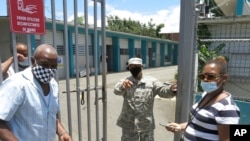Thousands of Puerto Ricans on Sunday got a second chance to vote for the first time, a week after delayed and missing ballots marred the original primaries in a blow to the U.S. territory’s democracy.
More than 60 of the island’s 110 precincts opened following a recent U.S. Supreme Court decision that stated a second round of voting would take place at centers that never opened on Aug. 9 or did not remain open the required eight hours.
The ruling permanently left out voters like Eldy Correa, a 67-year-old retiree who went to her voting center in the southwest town of Cabo Rojo three times last Sunday and desisted only to find out later that it opened late.
“They took away our right to vote,” she said, adding that she was upset with the president of the elections commission despite his apologies. “Sorry for what? That doesn’t resolve anything.”
The primaries for the pro-statehood New Progressive Party pit Gov. Wanda Vázquez against Pedro Pierluisi, who was Puerto Rico’s representative to Congress from 2009 to 2017. He also briefly served as governor after former Gov. Ricardo Rosselló resigned last year following huge protests sparked by a profanity-laced chat that was leaked. However, the island’s Supreme Court ruled that Vázquez, former justice secretary at the time, was next-in-line to become governor since there was no secretary of state.
Meanwhile, three candidates are running for the main opposition Popular Democratic Party, which sent a letter to U.S. Attorney General William Barr asking that his department investigate the debacle. Puerto Rico Sen. Eduardo Bhatia is running against Isabela Mayor Carlos Delgado and San Juan Mayor Carmen Yulín Cruz, known for her public spats with U.S. President Donald Trump.
The two main parties also have demanded that elections commission president Juan Ernesto Dávila resign. Dávila has said it would be irresponsible to do so amid the primaries, and that he would only consider the petition afterward.
Officials have blamed the chaos of the Aug. 9 primaries on ballots arriving late to the elections commission and trucks laden with materials not leaving until the day of the primaries, when usually they depart one or two days before. Dávila has said the ballots arrived late because of the pandemic, Tropical Storm Isaias and a last-minute request from both parties to print more of them.




